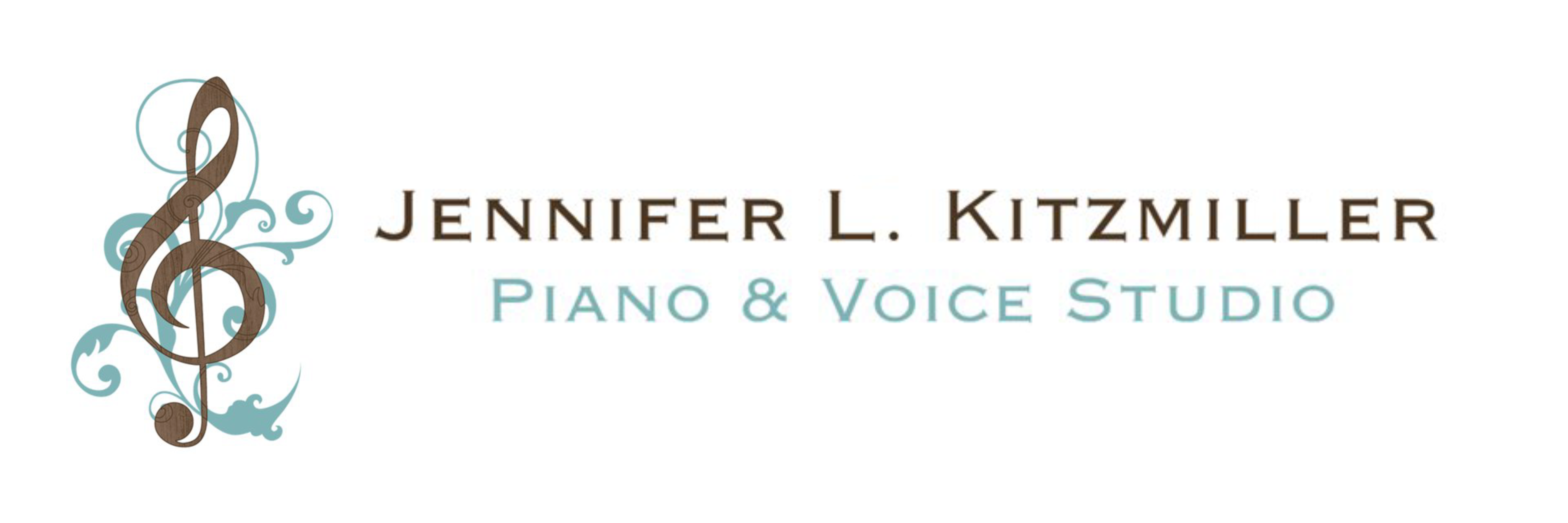What is unique about the Piano & Voice Studio of Jennifer L. Kitzmiller?
Well…the simple answer would be Mrs. Kitzmiller, of course! I am one of kind and a passionate music educator. Music is my life and I love passing on my skills and experiences to new students. I also love to laugh and consider it my goal to make sure that you’ve at least rolled your eyes at one of my jokes during your lesson! I think music education should be well-rounded and include goals of both the student and the teacher. I feel that musicians are collaborators. This philosophy pervades my teaching, both in the public school setting and in private teaching. You will often hear me ask my students what they think and how they would approach accomplishing a musical task. I do want my students to be musically literate in every sense of the words. Lessons will incorporate technique, sight reading, music theory, aural skills, music history, as well as, learning repertoire. Repertoire will encompass a wide variety of genres and be a combination of selections made by the student and the teacher.
How much am I required to practice?
In my own experience, I know that consistency and quality in practice – not quantity – are the most crucial factors when it comes to making progress. I can only recommend an amount of practice time each day, but I am much more likely to help a student outline a plan on HOW to practice, not HOW MUCH to practice.
Even when I was a student, I never felt I knew what and how to practice on my own, so changing this attitude is a large component of my teaching philosophy. I will plan with students on what progress goals to demonstrate for the next lesson and give specific ways to accomplish those goals. This approach has consistently led to more self-motivated students, who despite their busy lives, can demonstrate and discuss their progress.
During lessons, I keep a log of materials, goals, and practice suggestions on my iPad. At the end of the lesson, I can either print a paper copy of this or email this to the student and/or parents. This ensures that everyone, including myself, has an accurate record of lesson happenings. In the event, that adequate preparation and progress is not demonstrated for several consecutive lessons, we will have a discussion about resolving this issue and a per day amount of practice will be recommended.
Why do I need an acoustic piano? And how often do I need the piano tuned?
Despite technological advancements in recent years, even the best digital pianos fail to accurately replicate the wonderful feel and sound of the real thing! I do feel that both piano and voice students should practice with an acoustic piano, but do acknowledge that this is most especially true for piano students.
Thankfully, acoustic pianos hold their value better, so they are a worthwhile investment even when buying used. Before buying any piano, feel free to ask myself for an opinion about the manufacturer, brand, or condition of the piano you are considering. While I am not an expert, I can share the names and numbers of my trusted piano technicians, who specialize in piano restoration and repair, who are can come evaluate a used piano you are considering.
Acoustic pianos should be tuned twice a year by a piano technician (find one at ptg.org). Regular tuning is crucial to the development of the student’s aural ear, so that the student is hearing the proper pitches of each note of the piano. Skipping tunings is a lot like skipping oil changes for your car – not good! Over time, a well-maintained piano will begin to hold pitch better between tunings.
Do I need to pay for books and materials?
Some materials will be provided to the student that are free to distribute, but all students will have technique and/or repertoire books that will require purchase. There are a lot of materials out there, so together we will find the books that are within budget, challenging, and interesting. I have several music stores and online merchants that I use regularly and am more than willing to order and purchase books on your behalf. A receipt for reimbursement will be provided upon delivery of the books and payment should be added to the following months tuition total.
However, if you would like purchase your own materials, you are welcome to do so unless the purchase of these items is not done in a timely manner. I will be more than happy to try and incorporate any existing books you have in your family’s library or books you are able to borrow. I also have an ever-growing selection of repertoire that is available for borrow for short periods of time, especially if the borrowed book is on order for your student.
